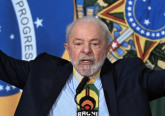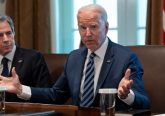Since the beginning of Russia’s war on Ukraine, Brazil, then still under Bolsonaro’s government, has maintained an official position of neutrality. Under Lula’s administration, this position did not change, frustrating many policymakers in the Global North. So what explains Brazil’s stance on the war in Ukraine? Dawisson Belém Lopes argues that Brazil’s position must be understood against the backdrop of its constitutionally enshrined pragmatic pacifism and diplomatic tradition.
Brazil’s diplomatic history and foreign policy tenets
Brazil has not always been a pacifist nation in international affairs. At the beginning of the 19th century, when the country gained independence from Portugal, the Brazilian elite was deeply concerned about maintaining the country’s territorial integrity. During this period, interstate wars were fought, particularly in the La Plata Basin region, in order to secure control of mineral resources, navigable waters, land, and the people who lived there. Bitter rivalries were cultivated with Argentina and Paraguay, not to mention less friendly relations with Chile, Peru, and Bolivia.
With Brazil still organising its armed forces in the early 1900s, while its neighbours’ armies and navies were already more sophisticated, any conflict that might break out would have meant massive destruction for the parties involved. The Baron of Rio Branco, Brazil’s foreign minister from 1902 to 1912 and a national hero in his own right, decided that South America’s largest and most populous nation would do better to avoid confrontation and adopt a peaceful stance. In one fell swoop, this radical departure from the bellicose stance of the 19th century earned Brazil a brand-new diplomatic reputation, while sparing scarce governmental resources and ensuring better conditions for the developing nation to grow richer and stronger.
Brazilian pacifism is thus the historical byproduct of a very acute sense of diplomatic pragmatism. These efforts to avoid wasting human and economic resources are key to understanding Brazil’s position on the war in Ukraine today – like it or not. It is driven by such practicality – the need to respond to the needs and emergencies of the domestic population – that Brazilian officials have formulated this current nonaligned stance. After all, cutting ties with either Russia or Ukraine and NATO countries does not seem to be in Brazil’s best interests, given all that would be at stake.
It is important to recall the constitutional backdrop against which Brazil’s current foreign policy is taking shape. Since 1988, two foreign policy tenets have been explicitly enshrined in the Brazilian Constitution: the defence of peace and the peaceful resolution of conflicts. Together with the principles of non-intervention, self-determination of peoples, and national independence, these principles explain Brazil’s reluctance to engage in any warlike discourse since the beginning of the 20th century. Although these principles were only enshrined in the Brazilian constitution at the end of the 20th century, diplomatic practice had long embodied this understanding of “pacifism as pragmatism”.
The role of public opinion in Brazil
When Russia invaded Ukraine on 24 February 2022, Brazil found itself in a delicate position. On 15 February 2022, just a few days before the start of the war of aggression, then President Jair Bolsonaro had visited Moscow and declared Brazil’s full solidarity with the Russian people. With the prospect of war already tangible, this open alignment with Putin was seen as unnecessarily risky for Brazil and completely incompatible with the South American nation’s diplomatic tradition. When the war finally broke out, Bolsonaro contradicted himself several times before returning to Brazil’s neutral stance.
Pollsters may have played a role in the course correction. In early March 2022, three national polls were published that included questions about Brazil’s position on the war. The one conducted by Ideia (from 8 March 2022) found that 65% of the Brazilian population supported neutrality as a diplomatic principle, even though 62% believed that Ukraine was right in its claims. Likewise, 65% thought that the war would end up harming Brazil’s economic situation. Two other polls released in the following week (by Ipespe and Quaest) also showed similar figures in terms of popular support for neutrality (62% and 71%, respectively). However, according to Ipespe, some 56% of Brazilians saw Ukraine as the rightful side in this war, against 8% who would favour Russia.
This broad social consensus in favour of neutrality led the Brazilian authorities to seek for a balanced position, albeit sometimes deliberately ambiguous, in order to accommodate all strands of opinion. Brazil has publicly condemned the invasion of Ukraine by Russia on 2 March 2022 by voting in favour of a UN resolution explicitly calling for the withdrawal of troops from Ukrainian territory. Nevertheless, Brazil’s ambassador to the UN, Ronaldo Mota Filho, took the opportunity to reiterate that Brazil would oppose both the imposition of unilateral sanctions on Russia and the supply of arms and ammunition, as these would only contribute to prolonging the war.
From this point on, Bolsonaro’s Brazil began to abstain from most resolutions condemning Russia or imposing sanctions, whether discussed at the United Nations or the Organization of American States (OAS). An important milestone was the UN General Assembly resolution of 7 April 2022, which suspended Russia from the Geneva-based UN Human Rights Council. Brazil justified its abstention vote on diplomatic grounds, arguing that the “polarisation and politicisation of the issue” could harm the plan to hold peace dialogues between the warring parties.
No change in policy despite a changing of the guard
Luiz Inácio Lula da Silva’s inauguration as president on 1 January 2023 did not mark a profound break with his predecessor’s foreign policy. Brazil’s stance on the Ukraine war under Lula remained very much in line with old diplomatic orientations. If anything, Brazil’s new engagement in global affairs brought the new president to the fore, so much so that the views expressed by Lula and his aides began to resonate more widely and – at times – to provoke heated reactions at home and abroad.
The most striking case was Lula’s interview with Time magazine in 2022 – one in which he claimed that the ongoing war was the fault of both Russia and Ukraine. This line of argument was repeated in 2023, when the Brazilian president made an official trip to the United Arab Emirates. In an impromptu speech, Lula again said that both parties were to blame for the failure to end the conflict. He even went so far as to claim that Washington and Brussels were ‘feeding the war’ by sending money and arms to Kiev along the way.
The Brazilian position has not changed structurally since February 2022. In practice, bilateral trade between Brazil and Russia has not only continued but has even increased. Brazil’s politically influential ‘agrarian caucus’ put pressure first on Bolsonaro, and now on Lula, so that the country did not stop importing fertiliser from Russia, as Brazil relies on this item to maintain its year-round crops and commodity exports. Compared to 2021, total trade between the two countries has increased by 34% in 2022.
Finally, since his inauguration as president, Lula da Silva has defended his proposed “peace club”, a diplomatic arrangement designed to bring Russia and Ukraine to the negotiating table. According to his master plan, only countries not directly involved in the war, such as Brazil, China, India, Indonesia, Mexico, and Argentina, would be entitled to successfully mediate and lead the peace process. If this plan has not yet been properly welcomed by Moscow and Kiev, it has reportedly sparked discussions and triggered proposals coming from Beijing, Paris, Pretoria, Copenhagen, the Vatican, New York, and elsewhere.






